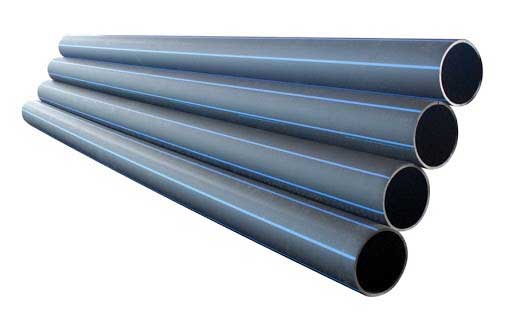Recognizing the Secret Advantages of HDPE Pipe for Water and Wastewater Management
Using HDPE pipeline in water and wastewater monitoring presents many advantages that warrant factor to consider. Its outstanding sturdiness and lengthy life expectancy make it a recommended option for many jobs. Additionally, the material's resistance to corrosion and chemical damages boosts its integrity in numerous environments. The advantages expand beyond simply durability and resistance. Pipe Manufacturing Midland TX. Discovering its cost-effectiveness and ecological influence exposes even more compelling reasons for its widespread adoption in contemporary infrastructure
Phenomenal Resilience and Durability

HDPE pipeline stands apart for its extraordinary sturdiness and long life, making it a preferred option in water management systems. Constructed from high-density polyethylene, these pipes can hold up against substantial pressure and stress, making sure reliable performance with time. Their robust nature allows them to withstand severe environmental conditions, consisting of temperature variations and dirt activities, which can create other materials to fall short.
The lifespan of HDPE pipes commonly goes beyond half a century, supplying a cost-effective service for towns and markets alike. In addition, the material's light-weight properties streamline installation, minimizing labor prices and timeframes. This toughness minimizes the need for frequent fixings or replacements, further boosting its financial appeal.
In water monitoring applications, the dependability of HDPE pipes suggests fewer disturbances and boosted solution connection, making them important to lasting framework advancement. The combination of sturdiness and longevity solidifies HDPE's role as a keystone in effective water administration remedies.

Resistance to Deterioration and Chemical Damages
While several products catch deterioration and chemical damages with time, HDPE pipelines display amazing resistance, making them ideal for different water administration applications. This durability comes from the molecular structure of high-density polyethylene, which is inherently non-reactive and does not rust like steels or deteriorate from exposure to rough chemicals. As a result, HDPE is highly reliable in environments with aggressive substances, such as wastewater systems that may have acids, bases, and natural solvents.
Additionally, HDPE pipelines can hold up against environmental elements such as soil level of acidity and saline conditions, better enhancing their suitability for varied applications (American Plastics HDPE Pipe Manufacturing). Their capability to preserve structural integrity gradually lowers the risk of leakages and failures, which is important in ensuring the safety and security and reliability of water distribution and wastewater management systems. Subsequently, the resistance to deterioration and chemical damage significantly adds to the general performance and durability of HDPE piping options
Cost-Effectiveness and Financial Benefits
When considering the monetary effects of water monitoring systems, the cost-effectiveness of HDPE pipes ends up being noticeable. These pipes offer lower installment and maintenance expenses compared to conventional products like steel or concrete. Their light-weight nature simplifies transport and setup, causing minimized labor expenses. Additionally, HDPE pipes show a long lifespan, often exceeding half a century, which converts to fewer replacements and long-term cost savings.
The resistance of HDPE to rust and chemical damage minimizes the need for expensive repairs and replacements. The pipes additionally support reliable water flow, reducing energy expenses related to pumping systems. By minimizing leaks and water loss, HDPE pipes add to significant financial advantages for districts and markets alike. Generally, the initial investment in HDPE piping can produce considerable monetary returns over the lifespan of the water administration system, making it a sensible choice for sustainable framework development.
Environmental Sustainability and Reduced Effect

Convenience and Flexibility in Installation
As a result of their unique homes, HDPE pipes use amazing versatility and flexibility in installation, making them ideal for a broad array of applications. Their light-weight nature permits much easier handling and transportation, reducing labor expenses and installation time. HDPE pipes can be bent and formed to fit numerous terrains and project demands, which is specifically helpful in testing settings.
Furthermore, their resistance to corrosion and chemical damages enables for installation in diverse setups without the need for specialized protective finishings. The ability to fuse joints produces a continuous, leak-free system, boosting the overall integrity and dependability of the installation. HDPE's versatility likewise accommodates ground activity, decreasing the threat of damages in areas susceptible to shifting dirt. In general, these qualities make HDPE pipelines not just versatile yet likewise a favored option for water and wastewater administration systems.
Regularly Asked Inquiries
Exactly How Does HDPE Pipeline Contrast to PVC in Water Management Applications?
HDPE pipeline offers exceptional flexibility, resistance to corrosion, and toughness compared to PVC. Its lighter weight helps with simpler setup, while its long lifespan decreases replacement costs, making HDPE a recommended option in water management applications.
What Is the Lifespan of HDPE Water Lines Under Regular Conditions?
Under regular problems, HDPE pipelines can have a lifespan varying from 50 to 100 years. Their sturdiness and resistance to rust add to their long-lasting performance in various applications, making them a reputable choice for infrastructure.
Are HDPE Piping Recyclable After Their Life Span?
Yes, HDPE pipes are recyclable after their life span. Midland TX HDPE Pipe Fittings in Stock. They can be refined and repurposed into new products, greatly hydro jetting reducing ecological impact and advertising sustainability within the industry, making them an eco-friendly option for piping options
What Is the Setup Refine for HDPE Pipes?
The installation process for HDPE pipes includes site prep work, trenching, pipeline fusion or mechanical signing up with, backfilling, and stress testing. Proper techniques guarantee a sturdy and effective system for transporting water and wastewater efficiently.
Can HDPE Pipeline Be Made Use Of for Both Safe And Clean and Non-Potable Water Equipments?
Yes, HDPE pipelines can be made use of for both potable and non-potable water systems. Their adaptability, resilience, and resistance to deterioration make them suitable for various applications, making sure secure and efficient transportation of water in different contexts.